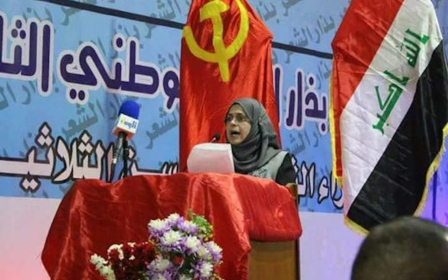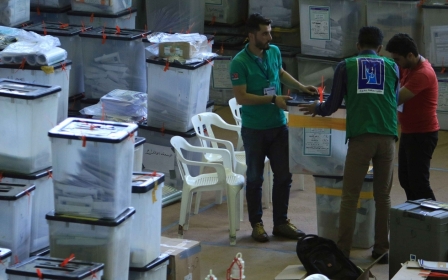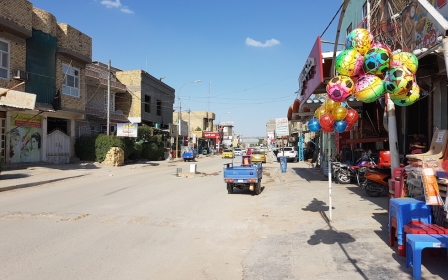Hunger strikes and 'hostage' situation follow fraud claims in Iraq's Kirkuk

KIRKUK, Iraq - A storm has kicked off in Iraq's Kurdish region over allegations of voting fraud as several political parties called for a probe into last Saturday's election.
At least six political parties in the Kurdish Regional Government (KRG) have called for an investigation into the outcome of the election, which they claim was riddled with irregularities.
In the fractious city of Kirkuk, which is still adjusting to its recapture by Baghdad after three years of Kurdish control, anger is simmering at an apparently enormous electoral victory of the Patriotic Union of Kurdistan (PUK).
The party, which many Kurds blame for cutting a deal with Baghdad to allow Kirkuk's recapture, had 184,300 votes compared with 83,000 for the Kirkuk Arab Coalition, and 79,000 for the Turkmen Front, according to preliminary results released by the electoral commission.
While the PUK claims it won fair and square, other parties have cried foul.
Outside one polling station on a road leading from Kirkuk to the towns of Taza and Tuz Khurmato, a group of mostly Turkmen demonstrators set up a protest camp. A number of young protesters began a hunger strike, promising to fast to the death unless a manual recount of votes is made.
"We want our rights - the election, all of it is fraud," said 20-year old Ahmed, speaking in broken Arabic. An older member of the Turkmen Front helped with translation from Turkish throughout.
"We want the recount in Kirkuk, not in Baghdad," he added.
"I will stay until I die. Until we get our rights."
Security forces at the scene, however, told Middle East Eye that the demonstration was "really calm" and the situation was "stable".
Erkan, 35, said he and his comrades had been on hunger strike for six days and that they were less concerned with the election results than they were with highlighting the neglected rights of Turkmen in the city.
"We want to show the world that the result of the election is not important for us - we just want to show the world our impact on Kirkuk and our role in Kirkuk."
After speaking, the hunger strikers flashed the "grey wolf'" sign, a Turkish ultra-nationalist hand symbol usually associated with far-right, anti-Kurdish organisations in Turkey.
'Occupied' Kirkuk
Kirkuk has been a hotbed of tensions since October 2017 when, following a successful but controversial independence referendum in Iraq's Kurdish region, Iraqi Prime Minister Haider al-Abadi launched a military campaign to take back land previously taken by Kurdish peshmerga forces during the 2014 pushback against the Islamic State (IS) group.
The city has long been valued for its proximity to the Bai Hassan and Avana Dome oil fields, which were recaptured along with the rest of the city by a combination of Iraqi army forces and Hashd al-Shaabi irregulars.
While there was fighting between peshmerga (particularly those linked to the Kurdistan Democratic Party) and Iraqi forces, the PUK leadership initiated a "tactical withdrawal" - after having controlled Kirkuk for three years - arguing that they would have been seriously outgunned in any fighting.
KDP leader and former president Massoud Barzani denounced the move as a "national betrayal" and his party boycotted the 2018 elections, arguing that the city was "occupied" by Baghdad's forces. Unlike in other Kurdish areas, the KDP's logo was nowhere to be seen in Kirkuk during the election, while PUK flags peppered the city.
First, the ethnic make-up of Kirkuk is a contested issue, with different communities claiming bigger numbers than they probably have.
Second, the 2018 Iraqi elections were poorly attended compared with previous elections; only 45 percent of those registered reportedly voted in Kirkuk.
Additionally, there is a new electronic voting system that has been a point of contention because of malfunctions and a susceptibility to tampering.
In spite of this, the electoral commission has rejected calls for a manual recount.
Ali Mahdi, a local leader of the Turkmen Front and one of the protest organisers, said the problem came down to hard-to-believe voting patterns in some demographics.
We have no doubt that the true results on the papers inside the boxes are different from the results that the commission declared
- Rabun Maroof, New Generation party
"In an Arab area, in Hawija, there are no Kurds," he said, referring to a district in western Kirkuk province.
According to results released by the commission, voters in the Arab- and Turkmen-populated district voted mostly for the Kurdish-led PUK.
Mahdi said his party had acquired information from a source on a cross-section of votes from Hawija.
"Out of 200 votes, they voted 118 to [PUK]. This is impossible; there is no one who is Kurdish in these areas."
He said that his party had, in tandem with Arabic parties in the district, filed a complaint to Baghdad alleging vote rigging.
His call has been echoed by numerous other political figures in Kurdish-populated areas - although not the PUK, unsurprisingly, which claims that the vote was legitimate.
Rabun Maroof, a Kurdish parliamentarian for the New Generation party, told Middle East Eye there were "irregularities and fraud in the elections".
"We have no doubt that the true results of the paper ballots inside the boxes are different from the results that the commission declared," he told MEE.
He said his party was turning to the federal court in Baghdad over the election outcome.
"According to the evidence and proof that we have in Sulaymaniyah, Kirkuk, Erbil and Duhok, the results that the IHEC declared are not the true results. We do not believe the majority of people voted for the PUK and KDP," he explained.
On Thursday, Abadi announced there would be an investigation into “violations conducted by the IHEC regarding its commitments”.
The UN’s special representative in Iraq, Jan Kubis, also weighed in on Thursday, saying IHEC had a duty to investigate complaints of misconduct.
“The commission has to act expeditiously in order to seriously address all complaints including, as necessary, the conduct of partial manual recounts in selected locations, notably in Kirkuk," he said.
He added that it was important to "uphold the peace" and not let tensions between the different groups spiral into violence.
Under control
Still, upholding the peace is often easier said than done in Kirkuk. An array of different armed blocs inhabit the city, including the federal police, the Iraqi army and the Hashd al-Shaabi. Antagonisms can flare up if the wrong group is deployed in any situation.
Raith Kareem explained that the Golden Division - which gained global and national fame as a skilled and effective non-sectarian group leading the campaign against IS - was specifically deployed at the Turkmen camp to prevent escalation.
"The situation is really under control here," he said. "The people of Kirkuk trust the Golden Division more than police."
He added that "sometimes in Kirkuk, Barzani's group, the KDP, causes problems".
For its part, the PUK has rejected claims that it interfered in any way with the voting and said that the past three years of PUK rule - during which it said there was stability, prosperity and relative social openness - is what attracted non-Kurdish voters to the group.
"The people who are demonstrating, the Turkmen Front, they didn't get the votes and that's why they are demonstrating," said Mohammed Shawki, a PUK peshmerga leader.
Across the rest of Iraq, the major winners of the election appear to be the Sairoun Alliance of Shia cleric Muqtada al-Sadr and the Iraqi Communist Party, which campaigned on an anti-corruption, anti-sectarian platform.
Despite the perception of the KRG as a beacon of stability in the Middle East, politicians in the rest of Iraq have been cordial in defeat and victory, while Kurdish areas have seen accusations, demonstrations and threats.
With only four months until the KRG holds local elections for its parliament, many will be hoping the situation can be resolved without the region's fragile peace unravelling.
New MEE newsletter: Jerusalem Dispatch
Sign up to get the latest insights and analysis on Israel-Palestine, alongside Turkey Unpacked and other MEE newsletters
Middle East Eye delivers independent and unrivalled coverage and analysis of the Middle East, North Africa and beyond. To learn more about republishing this content and the associated fees, please fill out this form. More about MEE can be found here.







